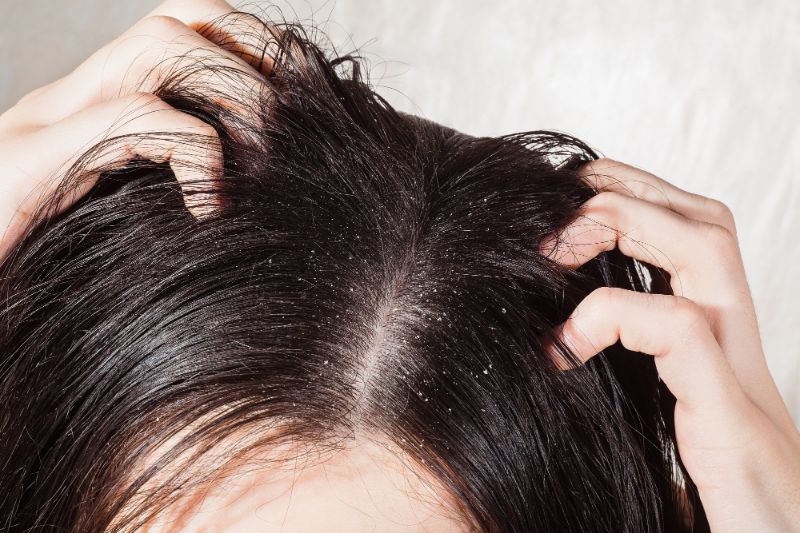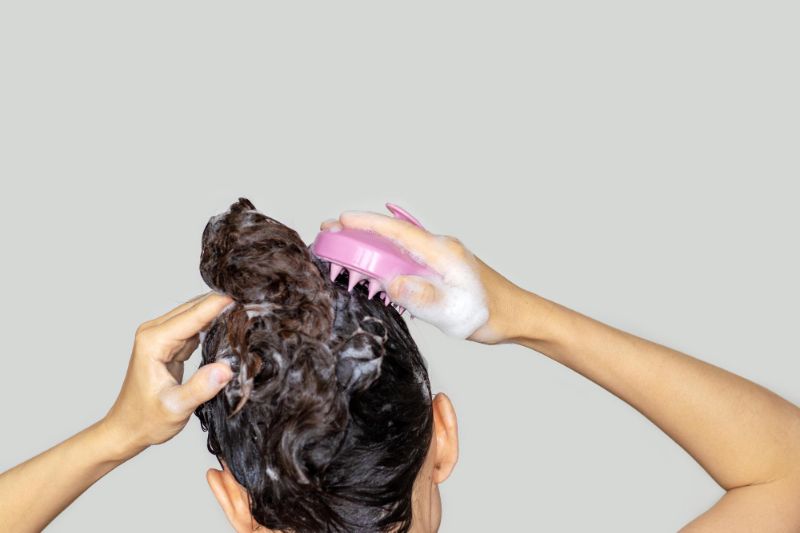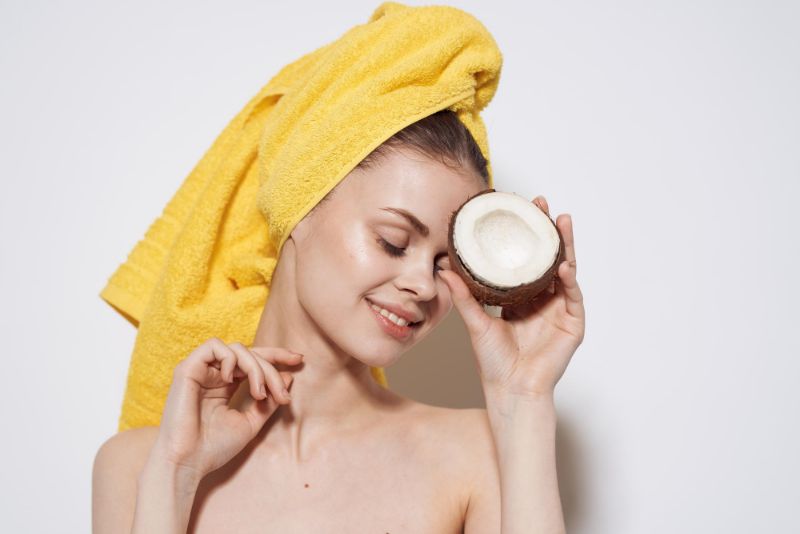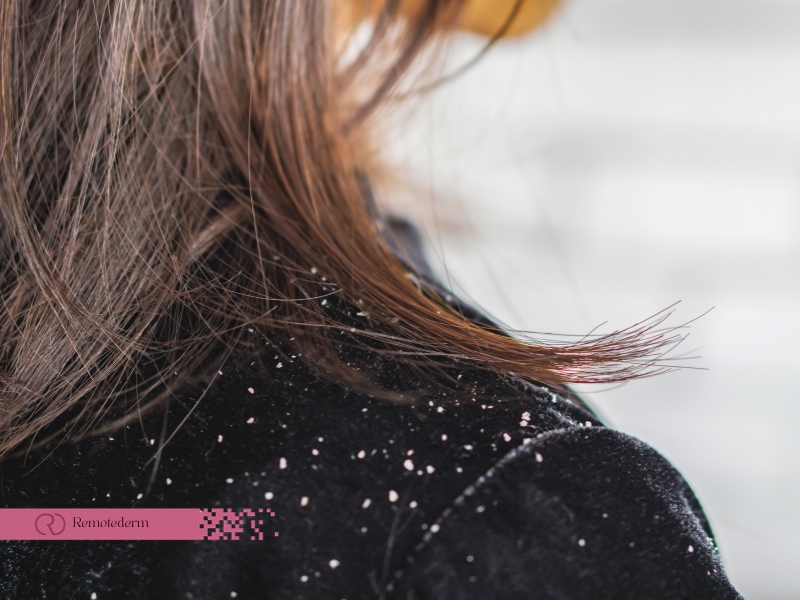Dandruff is a common scalp condition affecting millions of people around the world. While it may seem like a minor issue, dandruff can be both embarrassing and uncomfortable. It often leads to itching, and flaking, and can even affect your self-esteem. Understanding the different types of dandruff, their causes, symptoms, and effective solutions is crucial to maintaining a healthy scalp. In this comprehensive guide, we will explore various types of dandruff, their natural remedies, and how to manage dandruff during the summer months.
Types of Dandruff
Dandruff, a common scalp ailment, is not a one-size-fits-all condition. It can manifest in various forms, each with its own distinct causes and characteristics. In this section, we will explore three primary types of dandruff, their causes, symptoms, and solutions:
Dry Skin Dandruff
- Causes: Dry skin stands as one of the most prevalent causes of dandruff. When the scalp is deprived of adequate moisture, it becomes prone to flaking and itching. The skin’s natural barrier function is compromised, allowing dry skin dandruff to take root.
- Symptoms: Individuals grappling with dry skin dandruff commonly experience the presence of flaky white or greyish scales that cascade from the scalp onto their shoulders. Alongside this visible manifestation, itching often emerges as a persistent companion, causing further discomfort.
- Solutions: Managing dry skin dandruff necessitates a proactive approach to scalp care. Consider employing these remedies:
- Moisturizing Shampoo: Opt for a hydrating shampoo to infuse your scalp with essential moisture, thwarting the parched conditions that promote dandruff.
- Mind the Water Temperature: During hair washing routines, avoid the allure of hot water, as it can exacerbate dryness. Instead, opt for lukewarm water to gently cleanse without further desiccating the scalp.
- Coconut Oil Therapy: Embrace the soothing properties of warm coconut oil. Regularly massaging your scalp with this natural elixir serves to not only alleviate dryness but also lock in precious moisture, promoting scalp health.

Oily Scalp Dandruff
- Causes: Oily scalp dandruff, scientifically known as seborrheic dermatitis, emerges as a consequence of excessive oil production on the scalp. This overactivity of the sebaceous glands creates an environment conducive to the proliferation of a yeast-like fungus called Malassezia, a primary culprit behind this type of dandruff.
- Symptoms: Individuals grappling with oily scalp dandruff may notice the presence of yellowish, greasy scales adorning their scalp. These unsightly scales often accompany redness and persistent itching, adding to the discomfort.
- Solutions: Combatting oily scalp dandruff involves targeted strategies designed to restore scalp equilibrium:
- Anti-Dandruff Shampoo: Seek out specialized anti-dandruff shampoos enriched with ingredients such as zinc pyrithione or ketoconazole. These components effectively target the yeast overgrowth responsible for this condition.
- Regular Cleansing: Maintain a consistent hair-washing regimen to curtail excess oil buildup and inhibit fungal growth. Frequent cleansing removes the conditions conducive to dandruff formation.
- Product Choices: Exercise caution in selecting hair care products. Avoid heavy, oily hair products, as they can exacerbate the issue by further stimulating oil production.

- Causes: Psoriasis, a chronic skin condition, can extend its influence to the scalp, resulting in the development of dandruff-like symptoms. The exact aetiology of psoriasis is complex and multifactorial, involving genetic predisposition and immune system dysregulation.
- Symptoms: Psoriasis-related dandruff is characterized by the presence of thick, silvery scales on top of the scalp. These scales often coexist with redness and discomfort, making it a distinctive and potentially distressing condition.
- Solutions: Effectively managing psoriasis-related dandruff requires a comprehensive approach to address the underlying skin condition:
- Dermatological Consultation: Seek the guidance of a dermatologist for a precise diagnosis and tailored treatment plan. A professional assessment is crucial in determining the most suitable course of action. You can benefit from online hair dandruff treatment through platforms such as RemoteDerm.
- Medical Interventions: Treatments may encompass a range of medical interventions, including medications, topical creams, and phototherapy. These therapeutic modalities are administered under the supervision of a healthcare provider to manage psoriasis and its associated dandruff.
- Hydration and Nourishment: To complement medical treatments, maintain scalp health by keeping it moisturized with a non-irritating, fragrance-free moisturizer. Consistent hydration aids in alleviating discomfort and promoting a healthier scalp environment.

Natural Remedies for Different Types of Dandruff
While over-the-counter and prescription treatments are available, many individuals prefer natural remedies for dandruff. Here are some effective options:
- Tea Tree Oil
Tea tree oil has natural antifungal properties that can help combat dandruff, especially for those with oily scalp dandruff. Use a few drops of tea tree oil in your regular shampoo on a regular basis.
- Aloe Vera
Aloe vera gel can soothe an itchy scalp and reduce inflammation associated with dandruff. Apply fresh aloe vera gel directly to your scalp, leave it on for 30 minutes, and then rinse thoroughly.
- Coconut Oil
coconut oil for dandruff is a versatile remedy for various types of this condition. It moisturizes the scalp and has antifungal properties. Warm some coconut oil and massage it onto your scalp. Allow it to sit on your hair for at least 30 minutes before washing it.

- Apple Cider Vinegar
Apple cider vinegar has antimicrobial properties and can help balance the pH level of your scalp. As a rinse after shampooing, combine equal parts water and apple cider vinegar.
Dandruff in The Summer Season
Dandruff in summer months can be exceptionally bothersome due to increased heat and humidity. Here are some tips to manage dandruff in hot weather:
- Keep Your Scalp Clean: Regularly wash your hair to remove sweat and excess oil that can exacerbate dandruff.
- Choose the Right Shampoo: Opt for an anti-dandruff shampoo suitable for your specific type of dandruff. It should be used at least twice a week.
- Protect Your Scalp from the Sun: Wear a hat or use a sunscreen spray on your scalp when spending extended periods outdoors.
- Stay Hydrated: Drinking enough water helps maintain overall skin and scalp health.
- Avoid Excessive Heat Styling: Heat can cause your scalp to become dry. Minimize the use of hairdryers and straighteners during the summer.
- Maintain a Healthy Diet: Consume foods rich in essential nutrients, such as vitamins and minerals, to support a healthy scalp.
Types of dandruff: Final Thoughts
In summary, dandruff is a common scalp issue with various types, each requiring specific care. Dry skin dandruff benefits from moisturizing shampoos and gentle washing practices. Oily scalp dandruff demands specialized shampoos and regular cleansing. Psoriasis-related dandruff calls for dermatologist guidance and hydration.
Natural remedies like tea tree oil, aloe vera, apple cider vinegar, baking soda, and coconut oil can be effective. During summer, maintain scalp hygiene, use the right shampoo, protect your scalp from the sun, stay hydrated, limit heat styling, and eat a balanced diet.
Remember, managing dandruff is not just about hair health but also your confidence and well-being. This guide can help you navigate the path to a dandruff-free scalp.
FAQs
- Are there specialized shampoos for oily scalp dandruff?
Yes, anti-dandruff shampoos with ingredients like zinc pyrithione or ketoconazole can effectively target this type.
- Why is dandruff more bothersome in summer?
Increased heat and humidity can exacerbate dandruff, so maintaining scalp hygiene is crucial during hot weather.
- Can I have more than one type of dandruff simultaneously?
Yes, it’s possible to have a combination of dry skin, oily scalp, or psoriasis-related dandruff.
- Is dandruff contagious?
No, dandruff is not contagious; it is a scalp condition caused by a number of factors.
